AFP, politicians respond to Your Right to Know campaign
Labor leader Anthony Albanese has grilled Scott Morrison over whether he believes journalism is a crime in a heated question time where the Prime Minister accused the Opposition of trying to “gag the press”.
National
Don't miss out on the headlines from National. Followed categories will be added to My News.
- When government keeps the truth from you, what are they covering up?
- Question all Australians should be asking
- Six reforms Australia needs right now
- Australia should look to the US on press freedom
Prime Minister Scott Morrison has accused the Labor government of previously trying to “gag the press” after being asked about press freedom in an intense Question Time.
It comes after the Australian Federal Police (AFP) announced it had ordered has ordered an internal review of how it handles press freedoms and whistleblowers as politicians move to respond to the unprecedented Right to Know campaign.
During the heated session Labor leader Anthony Albanese asked “does the Prime Minister agree that journalism is not a crime?”.
Mr Albanese brandished several newspaper front pages - which had been redacted as part of the cross-media Right to Know campaign - at Mr Morrison across the chamber table as both parties erupted into interjections.
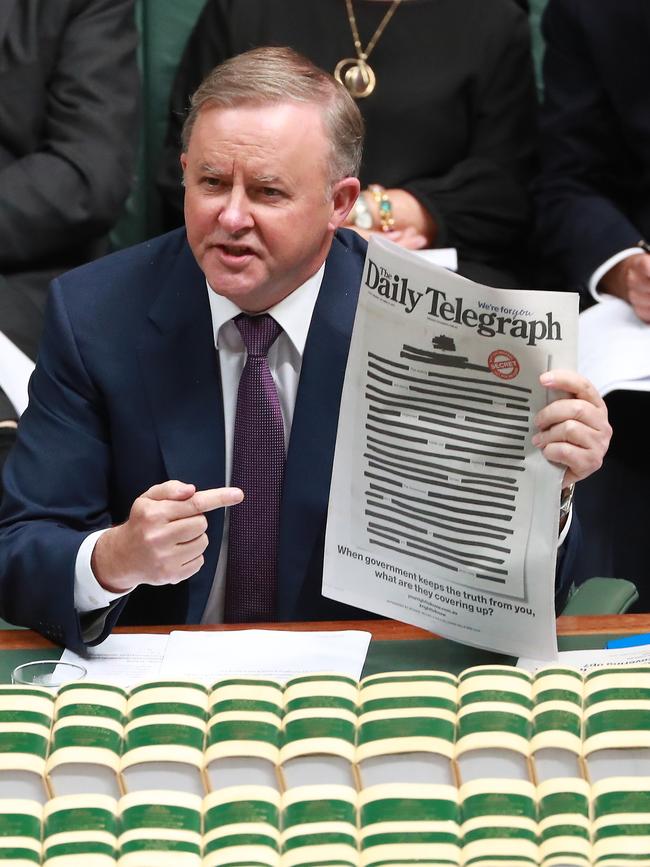
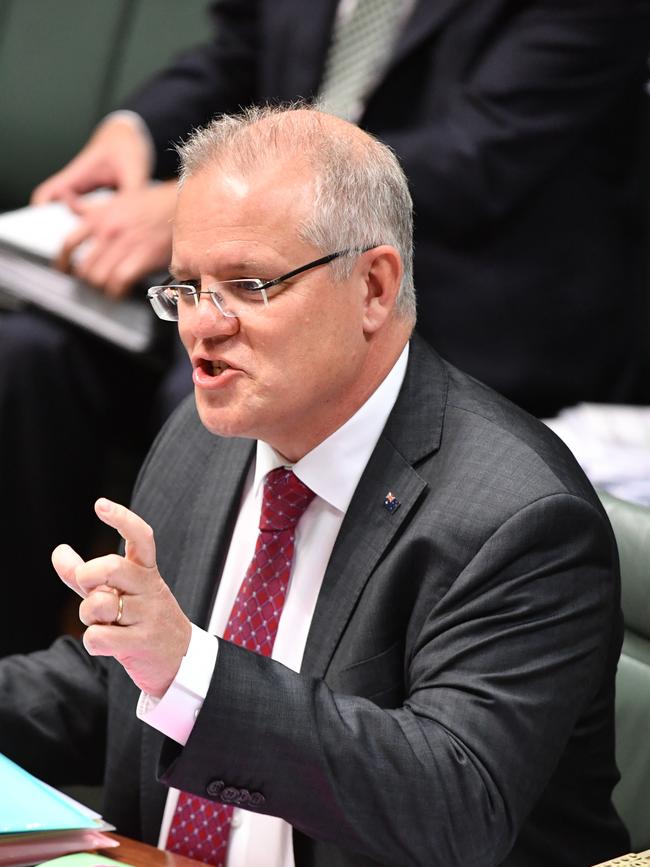
“I agree that journalism is not a crime. But I agree also, and I wonder if the leader of the opposition agrees, that if people – whatever profession they’re in, whether they’re politicians, whether they’re journalists, whether they’re anyone, Mr Speaker, a public officials, there is no one in this country who is above the law,” Mr Morrison said.
“People should not be prosecuted for their profession. They should only be prosecuted if indeed they have been found to be falling foul of the law, Mr Speaker.”
Mr Morrison further added he believed the decision to prosecute journalists shouldn’t be made “on the whim of politicians”, but rather “based on the rule of law”.
He then went on to accuse the Labor Government of previously trying to stifle the media with its “failed media reform laws”.
“Now, Mr Speaker, I am not going to take lectures from a Labor party who sought in this place when they were in government to try and muzzle the press,” Morrison said.
Australia’s Right to Know coalition of more than a dozen of the nation’s top media companies and industry organisations is campaigning for change to six critical areas of law that is allowing a veil of secrecy to being thrown over matters important to all Australians.
News Corp Australasia executive chairman Michael Miller this morning told radio station 2GB: “Nobody here is saying that anyone should be above the law”.
“The question is, does the law serve the public interest?” he said.
“If government operates on the basis of a culture which is, keep things secret because we don’t want it being discussed, then I think we as people, we as taxpayers, we as effectively owners of the government lose out. Because we don’t have the information on which to make informed decisions.”
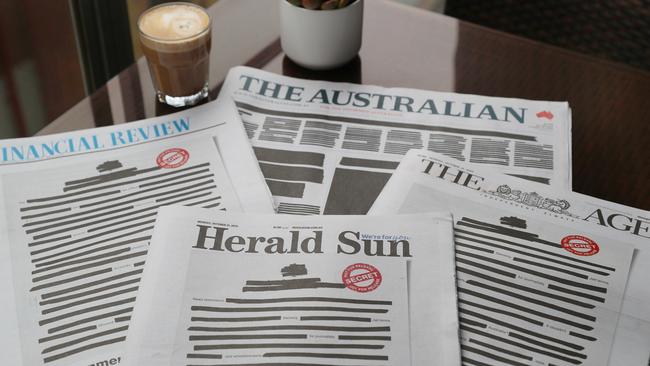
AFP ORDER FREEDOM REVIEW
The campaign follows Australian Federal Police (AFP) raids of News Corp political journalist Annika Smethurst and the ABC’s Sydney headquarters earlier this year.
During Senate Budget Estimates today, the Australian Federal Police ordered a review into press freedoms and whistleblower protects — the third since the raids.
“Annika is in this awful limbo where she doesn’t know if she be charged or not charged,” Mr Miller said.
“Annika recently returned from a US study tour where she heard that people from Lebanon, Eastern Europe had more protection than we have here.”
Ms Smethurst today threw her support behind the campaign on 2GB and detailed the raid on her home which was conducted by seven police officers.
“They spent seven hours going through both the physical things in my house – my drawers, my cookbooks and everything – as well as an online search so phones and computers,” she told host Ray Hadley.
“I couldn’t do a lot about that.”
YOUR RIGHT TO KNOW:
When government keeps the truth from you, what are they covering up?
Six reforms Australia needs right now
Question all Australians should be asking
The AFP have appointed a former top cop for the internat review, who will write new protocols on conducting arrests, raids and investigations.
This will be the third review into press freedoms in the wake of raids on the home of Ms Smethurst, and a planned but abandoned third day of raids believed to be on News Corp.
Newly appointed AFP commissioner Reece Kershaw told a parliamentary committee hearing he had not seen the front page of any of today’s newspapers, all of which had blacked out front page news stories in protest to perceived erosion of press freedoms.
Labor’s deputy Senate leader Kristina Keneally then helpfully held up each redacted front page of News Corp, Seven West and Fairfax newspapers for him to see for which he thanked her before she launched into a series of questions related to press freedoms.
Mr Kershaw said he did not know what sparked the extraordinary nationwide media protest as he was “an evidence-based police officer and for me I haven’t turned my mind to that” and he had not spoken to any media editor.
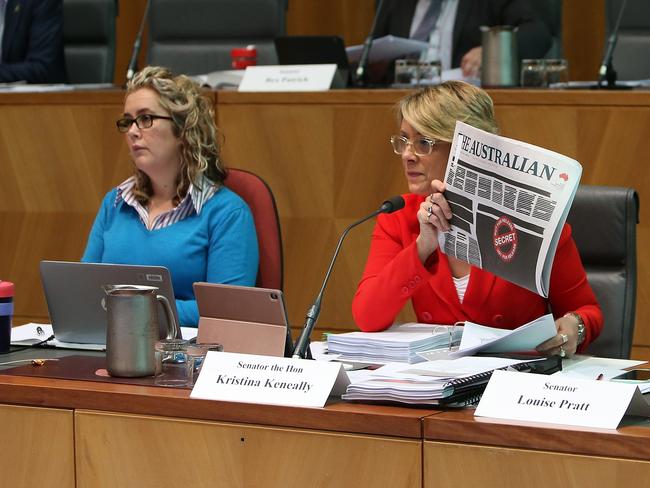
But he said he believed in democracy and press freedoms and that was why he had appointed retired deputy AFP commissioner and Australian Crime Commission chief executive John Lawler to review AFP’s handling of related issues and also speak personally with editors “when the time was right”.
He could not say whether this would be before two parliamentary inquiries into press freedoms or his own ordered internal review.
The review would look at all sensitive investigations including unauthorised disclosures, raids on the home of a News Corp journalist and ABC Sydney headquarters, espionage and foreign interference.
“The review will not be an audit into current matters at hand but rather a holistic approach to ensure we have in place investigative policy and guidelines that are fit for purpose,” he told the Senate legal and constitutional affairs committee.
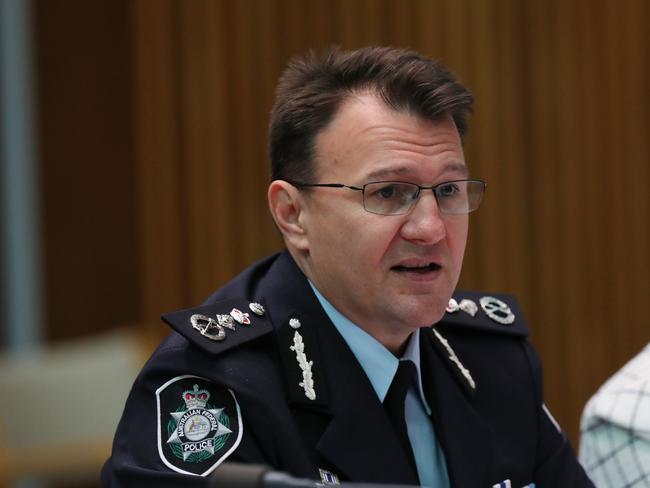
“Mr Lawler will provide my office with options around opportunities for interventions and strategies to ensure the AFP is best placed to address sensitive investigations in the future.”
Mr Kershaw said this would including “baselining” of what constituted a sensitive investigation, training and technology required, reformation of governance and business processes.
He said he had personally picked Mr Lawler who was a highly regarded investigator and the highest level of integrity and impartiality.
His review would be made public.
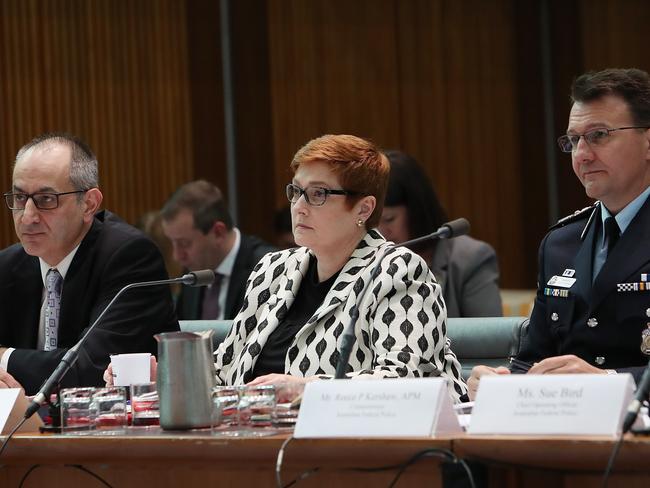
Mr Lawler, a highly respected veteran crime fighter, was 29 years with the AFO and led the operations to foil a terrorist attack in Australia in 2005 in Sydney and Melbourne, tackled organise crime and as head of the then Crime Commission revealed the bombshell findings on drugs and corruption in sport including match fixing.
JOYCE SLAMS PAST COVERAGE
Nationals MP Barnaby Joyce has argued press freedom is vital for democracy while simultaneously slamming the media for its coverage of his affair with former staffer Vikki Campion.
“The fourth estate is important, but you are not Clark Kent from the Daily Planet,” he told Sunrise this morning.
“We talk about the public interest is that it’s some indissoluble right, that’s a beacon of justice where everything else can be put aside to protect.
“Well that is the same indissoluble right that is used to take a photo of a pregnant lady, a private individual walking across the road, and you also believed that was in the public interest.”
JOURNALISM LICENSE PUSH
One Nation leader Pauline Hanson told the Today show this morning she believes journalistic credentials need to be toughened up to stop anyone from calling themselves a journalist.
“But we’ve got to be very careful who we define as being a journalist. People who write a book could be classified as a journalist or those people that blog on Facebook,” she said.
“But I believe that people must be accountable to the public whoever they are, what position they are in.”
The issue of a licensing system for journalists has been raised in the past because effectively, in Australia, anyone can call themselves a journalist.
But opponents have pointed to China’s restrictions on reporters, raising questions about who or what authority should decide if someone can work as a journalist.
Meanwhile, Senator Hanson said she didn’t think the media campaign would resonate with Australians although “I think it should”.
‘POLITICIANS EITHER RESPOND OR THEY DON’T’
Former Defence Minister Christopher Pyne has told Sky News that media organisations are “quite right” to seek to changes to the country’s level of press freedom.
Pyne this morning said he believed a lack of political scandals like the pentagon papers and a “high level of trust for government” made people less aware of government control.
“Obviously our journalists and our politicians co-operate to try and protect people, which is a very important priority,” he said.
“I think we’ve become over the years, maybe a very used to the government having more of a say then perhaps countries like Great Britain where their press seems to be terribly free.
“Perhaps we might have got to the point where that needs to be reviewed and the media outlets are quite rightly running a campaign to have that reviewed and good luck to them.
“That’s what democracy is all about the politicians either respond or they don’t.”
NO ONE ABOVE THE LAW
Prime Minster Scott Morrison spoke about press freedoms on the eve of the joint-media campaign, saying “no one is above” the law.
Speaking from Indonesia where he attended Joko Widodo’s inauguration, Morrison said: “My government will also believe in freedom of the press”.
“It’s an important part of our freedoms as a liberal democracy,” he said.
“(I) also believe in the rule of law and that no one is above it, including me or anyone else, any journalist or anyone else.
“And the rule of law has to be applied evenly and fairly in the protection of our broader freedoms.”
